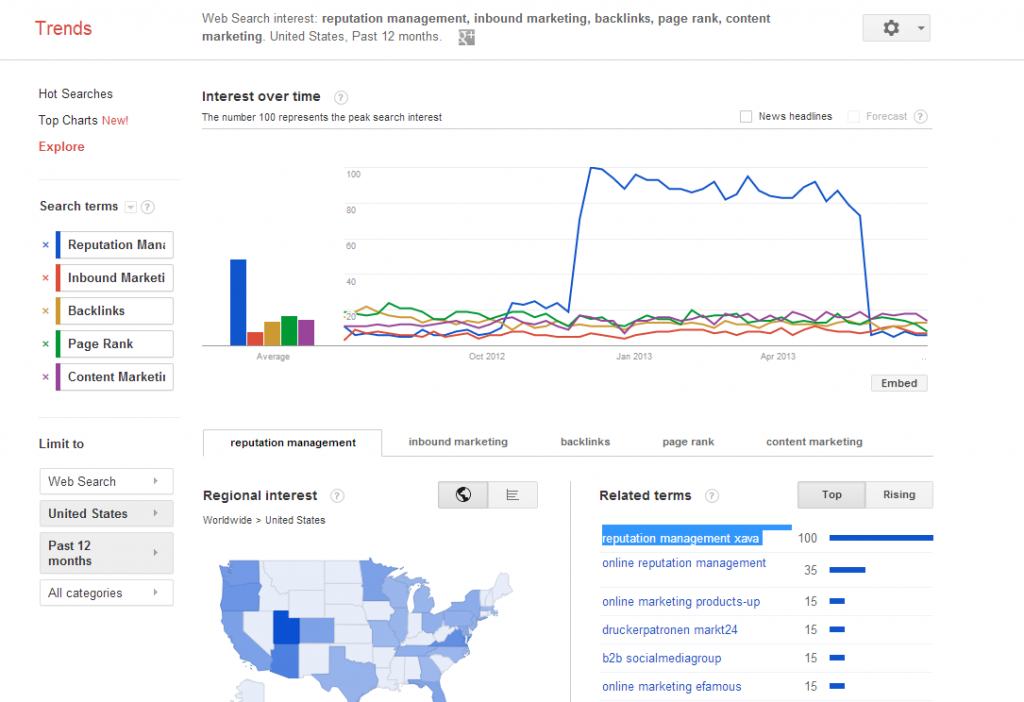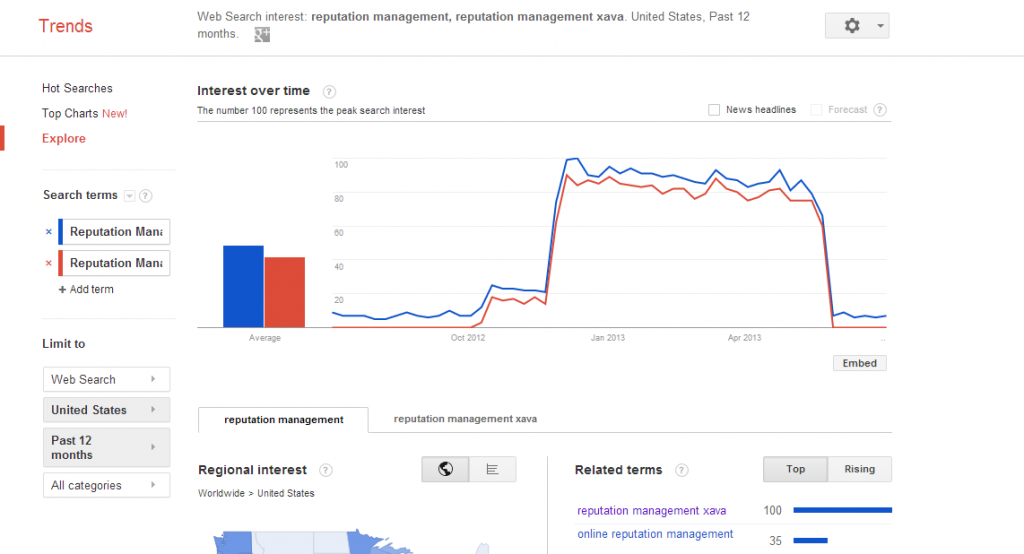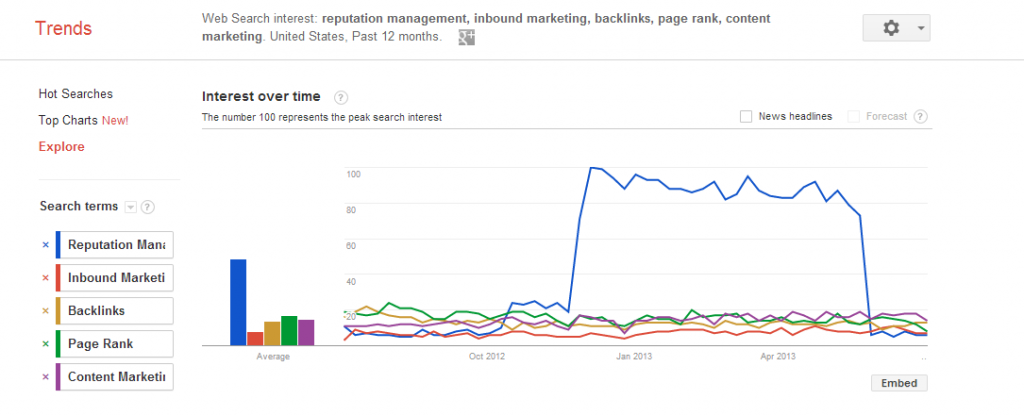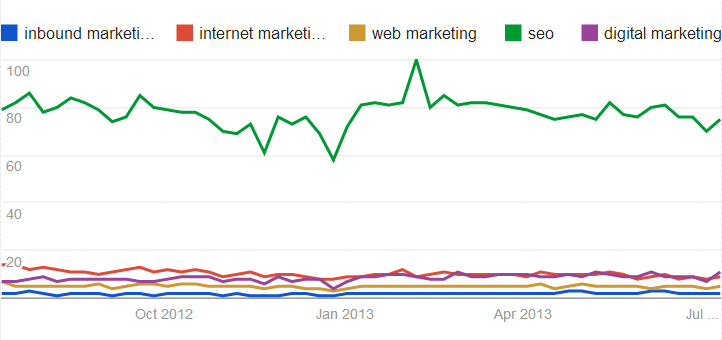I have been reading (like you may have been) lately all about how digital marketing agencies need to ditch words like ‘SEO’ and ‘internet marketing’ from their descriptions because the industry has evolved and people want to hire an agency that calls themselves ‘inbound marketing’ specialists or some equivalent. I was interested in how the search trends in the United States stacked up around a couple of buzzwords that are always getting thrown around. Perhaps it was time to rebrand ourselves as an inbound marketing agency. I had my doubts.
I started off checking in on something purely for my own amusement. I performed a similar trend analysis around internet jargon for an article in December. What was surprising that time around was the meteoric rise in popularity of the term ‘reputation management’. What showed this time around was a sharp decline in the phrase ‘reputation management’. I found this equally interesting. The more I thought about it, I though that it might make sense. That was a buzzword for a little while and certainly was popular when the whole Amy’s Bakery debacle was going on. That’s died down, maybe people have moved on to some other buzzword.
However, I noticed an interesting sidenote in this trend line. Get ready to put your tinfoil hats on – there was a suggested related term to ‘reputation management’ called ‘reputation management Xava’ that seems to at some point in the last twelve months have matched the top level of search volume for the general term ‘reputation management’ on this scale.

I don’t even care that part of this article’s meta title pertaining to reputation management gets cut off, no one is searching for it.
Obviously, that’s odd. I punched that phrase into Google and it returned a company in Berlin that appears to specialize in reputation management. Here’s what happens when you compare the two on the same search volume/timeline:

Seems like a fairly close correlation. Had I been duped in my first article? Was ‘reputation management’ artificially hot? Seemingly some form of either organic or intentional search popularity manipulation was going on. Were bots created by Xava spoofing internet searches from proxy servers in the U.S. in an effort for them to become the de facto auto-fill for that search term? It’s interesting to think about. There has been a lot of speculation about whether this strategy to become included in the list of Google’s suggested searches actually works. From what I have read, the results have been mixed. The problem in this case is that it doesn’t appear to have worked for them in the long term. At least they aren’t currently a suggested search for that term.
What is not clear is why it was done and if any of it worked, though. Perhaps that initial push around October did help Xava become a suggested search for a short time and that’s why it rose at almost the exact rate as ‘reputation management’. Maybe both search volumes were being inflated by someone. Maybe it wasn’t even Xava directly.
Xava isn’t currently showing up in the suggested searches for ‘reputation management’, but ‘reputation management Xava’ is showing as the suggested search when you simply type in ‘Xava’. Maybe they were pushing that offering specifically. Maybe a competitor was trying to manipulate the data for the sake of Google Ads or was having bots click those ads to eat up Xava’s advertising budget. I checked Spyfu to see if Xava.de was advertising on Google Ads in the U.S. and it returned no data, however.
There’s really no way to go back in time and tell why that search term and the general term ‘reputation management’ enjoyed a six month rise- and-fall. I personally have never tried to manipulate Google’s suggested search queries, so I have no idea about the volume of fake search necessary to do so. Maybe this is a roadmap.
Xava – if you read this, I’d be interested in knowing if this was intentional and whether it worked. I’ll be in German in September, we can meet up for a beer on me.
On with the jargon, down with inbound marketing, and up with content marketing
Excluding reputation management, what I expected was for ‘inbound marketing’ to be rising in the ranks. It was actually dead last. Let me say that again, inbound marketing was dead last in terms of these popular digital marketing search terms. So if you completely re-branded your site to be known as an inbound marketing expert, you may have to wait a little while longer for that ship to come in.

I singled in on the demise of ‘reputation management’:

Content marketing; so hot right now
It seems content marketing is what people are looking for leading into the second half of 2013. And that makes perfect sense. Content is as important as ever and people are having to come up with increasingly creative content in order to attract visitors. There also seems to be a lot of content-marketing-specific companies popping up and doing quite well. That makes sense too – more and more agencies are relying on good content in all forms of digital marketing. The industry is becoming more versatile. It’s no longer enough to be a one-trick shop. In order for an agency to compete, it needs to know all about what makes compelling content and where to push it.
Here are how five more generalized terms stack up:

SEO still dominates, followed by digital marketing, internet marketing, web marketing, and then dead-last again is inbound marketing. So in conclusion, if you are a digital marketing agency trying to build your business through inbound Google search, you can provide all of those other great benefits and well-rounded strategies to your clients, but you need to cater to where the people are looking for you, and that still appears to be ‘SEO’. Second to that, if you wanted to pepper in some information around ‘content marketing’, people seem to be looking for that too.
A notable miss:
‘Social Signals’. This phrase didn’t even have enough search volume to register on the scale. Turns out people don’t really care about it – despite its increasing contribution to a balanced footprint and brand signal. What does that mean? Social signals might be a good thing to mix in for diversity or to build brand recognition, but people aren’t hiring digital marketing agencies based on it. Maybe it’s too new.

Have you hugged your social media guru today? (social media guru photo credit: collegehumor.com)





